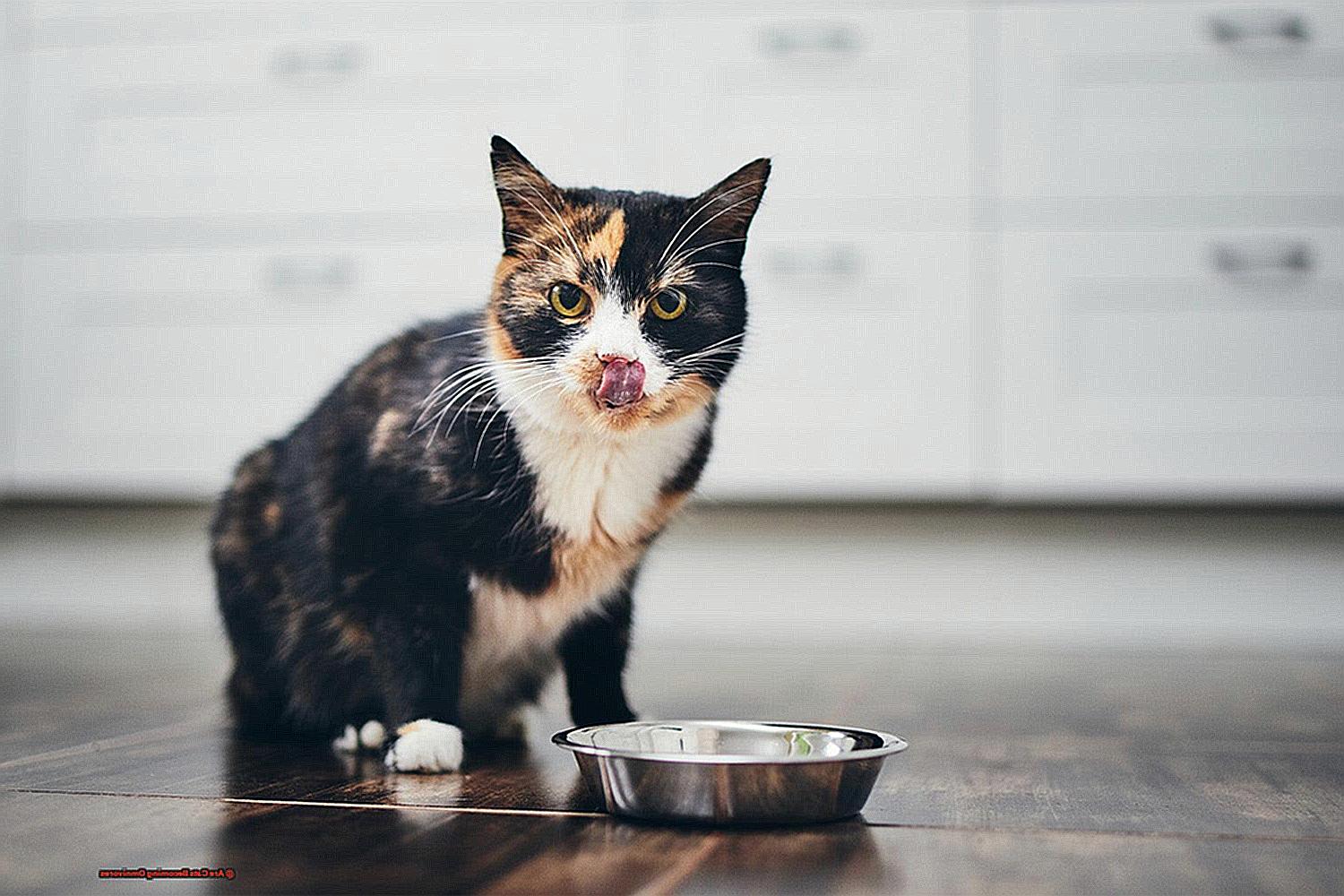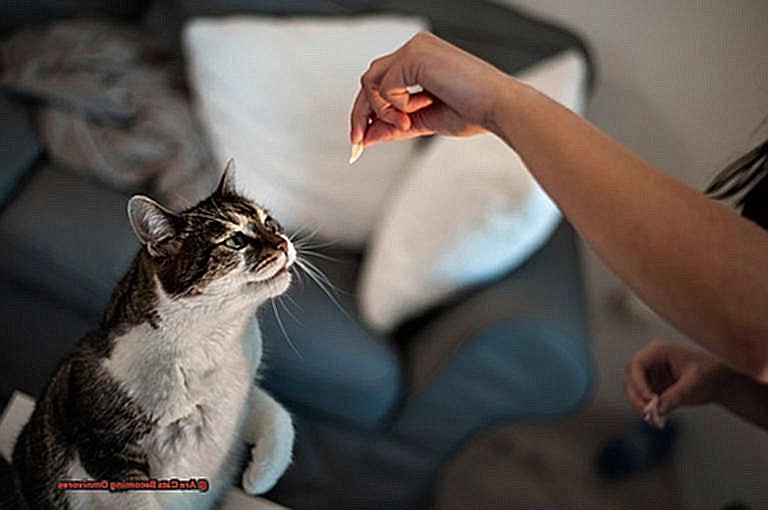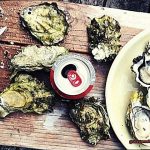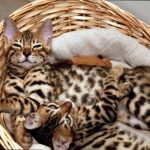Today, we embark on a journey into the heated debate surrounding feline nutrition: are cats truly becoming omnivores? For centuries, our furry companions have been labeled as obligate carnivores, meaning their diets must consist mainly of meat.
However, with the growing popularity of plant-based diets and the humanization of pets, some experts argue that cats may be evolving to adapt to a more varied diet. So, let’s put on our detective hats and dig deep into the evidence behind this contentious claim.

Get ready to uncover the truth about whether our beloved feline friends are shifting from strict carnivores to curious omnivores.
Are Cats Becoming Omnivores?
Contents
As cat owners, we want nothing but the best for our beloved feline friends. This includes providing them with a balanced and nutritious diet to keep them healthy and happy. However, with the rise of plant-based diets among humans, the debate about whether cats can thrive on a plant-based diet has become a hot topic in the pet community. As an expert on the subject, I want to shed some light on this ongoing debate and provide insights and potential implications for feeding cats a primarily plant-based diet.
The Truth About Cats’ Dietary Needs
First and foremost, it is essential to understand that cats are obligate carnivores. This means that they require a diet consisting mainly of meat to meet their nutritional needs. Their bodies are designed to process and absorb nutrients from animal sources efficiently. This is because cats have specific nutritional requirements that can only be met through consuming animal-based proteins, such as taurine and arachidonic acid.
Why the Debate?
So why is there a debate about whether cats can thrive on a plant-based diet? There are several reasons for this ongoing discussion. One factor could be attributed to the increasing popularity of vegan and vegetarian diets among humans. As more people switch to plant-based diets, they may also project their beliefs onto their pets and feed them a similar diet.
Another reason could be the availability of commercial cat food options that incorporate plant-based ingredients. Some pet food companies claim that these diets provide a balanced and complete diet for cats. However, many experts argue that these diets do not reflect a cat’s natural dietary needs as an obligate carnivore.
Can Cats Thrive on a Plant-Based Diet?
While some may argue that cats are becoming omnivores due to changes in their environment and prey availability, it is still debatable whether this is true. There is no conclusive evidence that cats are evolving into omnivores. In fact, research shows that a plant-based diet may not provide all the essential nutrients cats need to thrive.
The Rise of Plant-Based Diets for Cats: Factors Contributing to the Trend
As a cat owner, you want the best for your furry friend, including a healthy and balanced diet. But with the rise of plant-based diets for cats, you may be wondering if this is a suitable option for your feline companion. In this blog post, we will dive into the factors contributing to this trend and discuss whether a plant-based diet is right for your cat.
From Vegetarian to Vegan: The Influence of Human Diets
It’s no secret that plant-based diets have been gaining popularity among humans in recent years. This trend has extended to pet owners as well, with many seeking out vegetarian and vegan options for their cats. This shift is driven by the belief that a plant-based diet is healthier and more environmentally friendly for both humans and animals.
Ethical Concerns and Sustainability
Another factor driving the rise of plant-based diets for cats is the growing concern over the ethics and sustainability of traditional meat-based pet food production. As more people become aware of the impact of factory farming on animals and the environment, they are seeking out alternative options for their pets.
The Plant-Based Lifestyle: Extending to our Pets
For some cat owners, their decision to switch their cats to a plant-based diet is an extension of their own vegetarian or vegan lifestyle. They want to ensure that their pets are also following a cruelty-free and environmentally-conscious diet.
Commercial Options: Making it Easier for Pet Owners
In the past, switching a cat to a plant-based diet may have seemed daunting, with limited options available. However, the rise in demand has led to a variety of commercial plant-based cat food options on the market, making it easier for pet owners to make the switch.
Health Concerns: Addressing Allergies and Sensitivities
In some cases, feeding a cat a plant-based diet may be necessary for health reasons. Cats can develop allergies or sensitivities to meat proteins, making a plant-based diet a viable solution. However, it is essential to consult with a veterinarian before making any dietary changes for your cat.
Vegan and Vegetarian Diets for Cats: Myth or Reality?
You carefully select their food, making sure it’s nutritious and meets their specific dietary needs. With the rise of vegan and vegetarian diets among humans, some people have started to wonder if these diets can also be suitable for cats. After all, why not extend our ethical and sustainable lifestyle choices to our pets as well? But is this just a trend, or is it a viable option for our feline friends? Let’s dive into the potential risks and drawbacks of feeding cats a plant-based diet.
Cats are obligate carnivores, meaning they require meat in their diet to survive. This is due to their evolutionary history and their digestive systems being designed for a high-protein, meat-based diet. While there have been a few reported cases of cats living on vegan or vegetarian diets, these are rare and often require strict supplementation and monitoring from a veterinarian.
One of the main concerns with feeding cats a plant-based diet is meeting their specific nutrient requirements. Cats need certain nutrients that can only be found in animal-based proteins, such as taurine and arachidonic acid. These nutrients are essential for cats’ eye and heart health, as well as their overall well-being. While plant-based proteins can provide some of these nutrients, they are not in the same bioavailable form as animal-based proteins, meaning cats may not be able to properly absorb and utilize them.
Some may argue that cats in the wild consume small amounts of plant matter through the stomach contents of their prey. However, this does not equate to a significant portion of their diet being plant-based. Cats lack the enzymes necessary to digest and break down plant matter efficiently. This can lead to digestive issues and nutrient deficiencies if a cat’s diet is primarily plant-based.
It’s important to note that while cats may survive on a vegan or vegetarian diet, it does not necessarily mean they are thriving. The long-term effects of these diets on cats’ health and well-being are still unknown. Cats’ biology and evolution point to them being obligate carnivores, and a diet consisting mainly of plant-based proteins is not suitable for their nutritional needs.
Commercial Cat Food Options: Are They Meeting a Cat’s Nutritional Needs?
Feeding your cat a well-balanced diet is crucial for their health and happiness. As a cat owner, it’s important to understand the potential issues with relying solely on commercial cat food and the impact it may have on your feline friend’s nutritional needs.
Commercial cat food options have exploded in popularity, offering a wide range of brands and flavors. However, what many cat owners may not realize is that these convenient options may not fully meet their cat’s nutritional needs. In fact, a study by the Journal of Animal Science found that only 30% of commercial cat foods meet the minimum requirements for essential nutrients for cats.
But how can this be? After all, don’t these foods claim to provide a complete and balanced diet for our cats? The truth is, many commercial cat foods contain fillers such as grains and vegetables that do not provide the necessary nutrients for cats. As obligate carnivores, cats require a diet that is primarily made up of meat to thrive.
You may be wondering, what harm can a few fillers do? Well, for one, these ingredients are often used to bulk up the food and make it more affordable, but they do not provide the essential amino acids and proteins that cats need from their diet. This can lead to deficiencies and health issues in the long run.
But that’s not all – many commercial cat foods also contain artificial preservatives, colors, and flavors. These additives may be harmful to your cat’s health and can lead to allergies, digestive issues, and other health problems.
As a cat owner, it’s important to read the ingredient labels on your cat’s food carefully. Look for high-quality options that provide a balanced and complete nutrition for your feline friend. It’s also helpful to consult with your veterinarian or do thorough research on different brands to ensure you’re making the best choice for your cat’s health.
If you’re looking for alternative options, consider a raw or homemade diet for your cat. This allows you to have more control over the ingredients and ensure your cat is getting the necessary nutrients from their food.
Adapting to Environmental Changes: Is This Causing Cats to Become Omnivores?
Urbanization and human influence are two major factors that have been linked to the perceived shift towards omnivory in cats. With the steady increase in urban areas and the loss of natural habitats, cats may struggle to find their traditional prey. This can lead to them scavenging for alternative food sources, including plant-based foods. Additionally, with the rise of veganism and vegetarianism, some pet owners may choose to feed their cats a meat-free diet. While cats can survive on these diets, they may not be getting all the necessary nutrients, leading them to seek out other food sources.
But is this really causing cats to become omnivores? Some experts argue that it may simply be a lack of understanding of their natural behavior. Cats are known for being opportunistic predators, meaning they will eat whatever is available to them. This does not necessarily mean that they are becoming true omnivores. Furthermore, studies have shown that cats have evolved to be more adaptable to different environments and food sources, which may explain their ability to survive on a more diverse diet.
However, it is important to note that while cats may occasionally consume plant-based foods, it is not a significant part of their diet. Their digestive system is still designed to process animal-based protein, and they may not be able to obtain all the necessary nutrients from plant-based sources alone. This could lead to health issues if their diet is not properly balanced.
So what can you do as a responsible cat owner? First and foremost, it is essential to provide your cat with a balanced and species-appropriate diet. This means opting for high-quality cat food or considering a raw or homemade diet. These options provide your cat with all the necessary nutrients they need to thrive.
Debunking the Myth of Cats Becoming Omnivores: What Science Says
As pet owners, it is our responsibility to provide our furry friends with the best possible care, including their diet. With the rise of urbanization and human influence on their environment, there has been a misconception that cats are becoming omnivores due to their changing diet and behaviors. However, as an expert in this field, I am here to debunk this myth and clarify the concept of “omnivores” and how it applies to animals, specifically cats.
Firstly, let’s define what an omnivore is. An omnivore is an animal that can consume both plant and animal matter as a significant source of nutrients. This leads to the misconception that cats, who have been observed consuming plant matter in the wild, are evolving into omnivores. However, this is simply not true.
Scientific evidence proves that cats are obligate carnivores, meaning they require animal protein as the main source of their nutrition. One of the main reasons for this is their anatomy and digestive system. Cats have sharp teeth and short digestive tracts, which are characteristic of carnivorous animals. They lack the enzymes necessary to break down plant fiber efficiently and extract the necessary nutrients from it.
Furthermore, studies have shown that when cats consume plant matter in the wild, it is primarily for digestion purposes. It helps them regurgitate hairballs or aids in passing indigestible materials through their system. Plant matter does not provide significant nutritional value for cats.
Feeding cats a predominantly plant-based diet can have severe consequences on their health. Cats require certain essential amino acids and vitamins that can only be obtained from animal protein sources. A lack of these nutrients can lead to nutritional deficiencies and various health issues such as heart disease and skin problems.
It is crucial to understand a cat’s natural dietary needs and provide them with a species-appropriate diet. As pet owners, we must resist the urge to humanize our cats and remember that they are still carnivorous animals at their core.
The Dangers of Feeding Your Cat a Plant-Based Diet
As a cat owner, you want the best for your furry friend. You might have heard that feeding your cat a plant-based diet is a more ethical and environmentally-friendly choice. But as an expert on the topic, I am here to tell you that this could be a dangerous decision for your cat’s health.
Cats are obligate carnivores, meaning they require essential nutrients found in animal-based products to survive and thrive. These include taurine, arachidonic acid, and vitamin B1Without these nutrients, cats can develop serious health issues.
Unfortunately, some cat owners have started feeding their cats a vegan or vegetarian diet, believing it to be a healthier option. However, this can lead to heart disease, blindness, and even death in cats. It’s not just a matter of preference – it’s a matter of their health and well-being.
Plant-based diets for cats are not recommended by veterinarians and can be considered animal cruelty. Cats lack the necessary enzymes to break down and utilize plant proteins efficiently. This can lead to malnutrition and deficiencies in essential amino acids. Think of it like trying to fill up your car with the wrong type of fuel – it just won’t work properly.
Cats also require a high amount of protein in their diet, which is difficult to achieve with a plant-based diet. Even the most protein-rich plants cannot provide the same level of protein as animal-based products. Additionally, plant-based diets often lack the necessary fat content for cats, which can lead to skin and coat problems.
Moreover, plant-based diets may cause digestive issues in cats as their digestive systems are not designed to handle high amounts of carbohydrates found in plants. This can result in vomiting, diarrhea, and other gastrointestinal problems.
Conclusion
After delving into the ongoing debate on whether cats are becoming omnivores, it is clear that this topic sparks strong opinions. While some argue that cats are evolving to include more plant-based foods in their diets due to environmental changes and human influence, scientific evidence proves otherwise. Cats are obligate carnivores, meaning their bodies are designed to thrive on a primarily meat-based diet.
But why does this matter? Well, feeding cats a plant-based diet can have serious consequences on their health and well-being. It’s not just about personal beliefs or preferences; it’s about meeting their specific nutritional needs. As responsible pet owners, it is our duty to provide our furry companions with a balanced and species-appropriate diet in order for them to live long and healthy lives.
Let’s put an end to the myth of cats becoming omnivores and instead focus on educating ourselves and others on the importance of proper feline nutrition. Our beloved feline friends deserve nothing less than the best when it comes to their diets. So let us continue on this journey together towards understanding the unique dietary needs of our cats.






